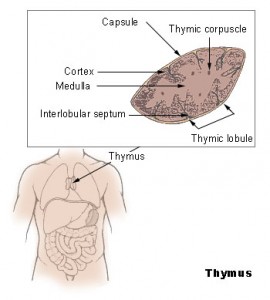They are in the air we breathe and on the objects we touch. Germs, such as bacteria, viruses and parasites, are all around us. The thymus, an important structure of the immune system, is responsible for the production and storage of a vital cell called the T cell. T cells help to recognize and defend the body from various infections and foreign invaders. In a recent study, led by Professor Clare Blackburn from the Medical Research Council Centre for Regenerative Medicine at the University of Edinburgh, scientists were able to construct a fully functioning thymus in the lab.
This was done by collecting fibroblast cells, which play a role in making collagen and the extracellular matrix for tissues, from the mice embryos. The collected cells were then genetically altering to express a particular gene not normally present in the fibroblast cells. As a result, these modified fibroblast cells began to function like regular thymus cells. The study had shown that when scientists transplanted the altered cells back into the mice, the cells had organized themselves into a functioning thymus organ
Youtube Video Courtesy of: Medical Research Council
This important study will have a major impact on the healthcare field as this opens a potential opportunity for lab grown thymus’ to be transplanted into human patients who suffer from immunodeficiency. For example, bone marrow transplants patients are more easily at risk of infections due to a decrease in the number of granulocytes, which are a type of white blood cell, and elderly patients as the thymus naturally deteriorates with age. In addition, patients who are born without a thymus, also known as DiGeorge Syndrome, who suffer from many complications such as low levels of calcium, heart defects and a poor functioning immune system will also benefit from this finding. Therefore, a lab grown thymus is such a new and exciting finding as it could be the key to protecting these patients from various health concerns and even death.
Although it would be nice to begin using this process immediately, Blackburn stated that this study had, so far, only been conducted on mice and there are plenty more steps that need to be taken, such as applying this technique to human cells and testing their functions in models, before we can apply this technique on human patients.
Nonetheless, this is an exciting finding as we can hopefully apply this technique in the future to human patients who suffer from weaken immune systems. Not only will this study help patients who suffer from immunodeficiency but this can also reduce the challenges that come with finding a correct match between an organ donor and organ recipient!
– Candace Chang

